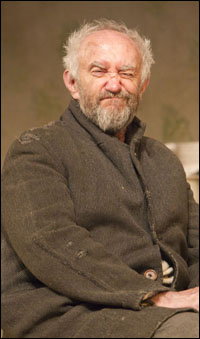
*
Jonathan Pryce is one of Britain's most acclaimed actors. Yet, over the past four decades, New York City has seen him exactly four times: In the 1977 Broadway premiere of Comedians, for which he won a Tony Award; briefly, in the 1984 Broadway staging of Accidental Death of an Anarchist: 1990's Miss Saigon, his most famous role, which won him a second Tony; and as a replacement actor in 2006 in Dirty Rotten Scoundrels. He returns May 3-June 17, in a production of Harold Pinter's The Caretaker at the Brooklyn Academy of Music's Harvey Theater. The tense drama about two brothers, Mick and Aston, and a homeless man named Davies, in a room in London, is produced by Theatre Royal Bath Productions/Liverpool Everyman and Playhouse. Bowing in 2009, it played Liverpool and then London, later appearing in San Francisco, Adelaide, Australia and Columbus, OH. Pryce talked to Playbill about the production, which has been, in several ways, a homecoming for him.
How did the role of Davies come about for you?
Jonathan Pryce: It goes back two and a half years, at least, when I was recording a TV show with [director] Christopher Morahan. While we were filming it, he asked me if I ever thought of playing Davies in The Caretaker. I said that, ever since playing Mick at The National, I thought I would want to play Davies.
So you've done the play before.
JP: Yes, as a young man, playing the younger role. I've always wanted to do it. But I said, "If I do it, I want to do it at in Liverpool, at the Everyman Theatre." That's where I started, in 1972.
Just a sentimental choice on your part?
JP: It was, yes. And, also because that building has now been torn down and they're building a new theatre. I just wanted to do one more show in the old building. It's a place — as I said, I started as an actor there, but as a teenager I would go there to hear bands in the '60s. It has a lot of resonances for me. And then, I was asked to take The Caretaker to London, which I did. Then the invitation came from BAM, to take it there. Unfortunately/fortunately, their only available slot was May 2012. This was two years ago. So, I've been waiting, growing my beard! I'm very excited to come to New York with a play, which I haven't since the 1970s, when I did Comedians and, briefly, doing The Accidental Death of an Anarchist. The other projects in New York have been musicals.
| |
 |
|
| Jonathan Pryce in The Caretaker. | ||
| photo by Shane Reid |
JP: Yeah, I think so. A lot of things have changed. Obviously, for me; but society has changed, too, not only since I performed it in the 1980s, but since it was written in the late '50s. People's perception of the homeless and mentally ill people who are not getting the right care and attention [has changed]. I grew up learning about tramps when I was growing up in the countryside in Wales. A tramp was a romantic figure who trudged the highways. Now, of course, that Davies figure represents something much different, a kind of tragic figure. Those people have multiplied on the streets. People's view of the homeless have changed. And I think their lives are much more brutal. And people's views of the mentally ill have changed. When Harold wrote the play, there were more people who were institutionalized. Certainly, in Britain, with Thatcher's government, new policies were introduced. Many hospitals were shut down. I think "care in the community" was the phrase that was used then. Of course, it meant no care in the community, and more people on the street who needed help. Having said all that, what this play still retains is a great deal of humor dealing with the people's dilemmas. But it's also a very dark piece.
When you first did it, did you interact with Pinter?
JP: Yes. We first recording it with the BBC as a TV show. It was at the time of his 50th birthday, and the National wanted to celebrate his birthday. We were invited to stage it. Harold was around for all those rehearsals.
Did he offer advice, or just keep quiet?
JP: Harold famously kept quiet in a vocal way. If you asked him a question about the text, he would say, "I don't think the text tells us that." He was resistant to imposing any view on the play. We asked him about the "Pinter pauses" and whether they should be observed. At the time, he said they were there to observe if you wanted to, or to ignore if you didn't want to [observe them], but generally they were there in order to get you a laugh. But it is the most beautifully written piece of work.
Was there anything Pinter said back then that gave you a clue on how to approach Davies this time?
JP: No. [Laughs.] Except — he is right. He said either the text doesn't tell you anything about the character or backstory, or it is all in the text. It's such a rich, dense text. It is all there. It feels very natural. It is very difficult to learn, because there are a number of repeats, where you go back on yourself, and a few non sequiturs. It was very hard for me to learn the first time around, because it is my habit to come to rehearsal not having memorized the part.
So you don't arrive letter-perfect.
JP: No. And, sadly, I don't leave letter-perfect. [Laughs.] But the older I get, maybe I should start learning things before. I'm playing Lear after this. I've got a four-week break before we start rehearsals in London. And I think I'm going to have to start learning some of those set pieces.











